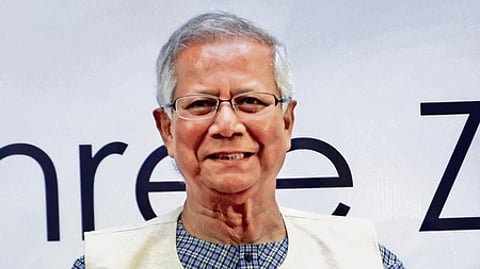

NEW DELHI: Bangladesh’s interim leader Muhammad Yunus is considering stepping down from his post, citing mounting political deadlock and lack of consensus among key parties, according to a report by the BBC Bangla Service.
Student-led National Citizen Party (NCP) chief Nahid Islam told the BBC that Yunus appeared deeply concerned about the worsening political climate and questioned his ability to continue leading the country.
"He (Yunus) said he is thinking about it (resignation). He feels that the situation is such that he cannot work," Islam said Thursday night after meeting the 84-year-old Nobel laureate.
Islam said he visited Yunus after rumors about his resignation spread throughout the day. “Sir (Yunus) said, ‘If I can’t work— I was brought here after a mass uprising to bring change and reform to the country. But in the current situation, with mounting pressure from movements and the way I’m being cornered, this isn’t how I can work,’” he quoted Yunus as saying.
Another report citing unnamed sources close to the interim chief stated Yunus had voiced his intent to resign during a cabinet meeting earlier Thursday, frustrated by a lack of support from political factions. However, advisers reportedly persuaded him to remain in office.
Islam, a former adviser in the interim government and a key figure in the Students Against Discrimination (SAD) movement, said he urged Yunus “to stay strong for the sake of the country's security, and future and to meet the expectations of the mass uprising”, adding, “I hope everyone will cooperate with him.”
Yunus assumed leadership after the SAD-led uprising forced Prime Minister Sheikh Hasina from power on August 5, 2024. The former prime minister fled to India with military assistance, and Yunus returned from Paris three days later to take charge of the interim government.
His possible resignation surfaces amid growing friction with the military over election timelines and a controversial policy involving a humanitarian aid corridor into Myanmar’s conflict-ridden Rakhine state. Armed forces chiefs, including Army Chief General Waker-Uz-Zaman, recently pressed Yunus to hold elections by December and expressed concern over the Rakhine issue.
The army, which played a key role in Hasina’s exit and Yunus’s appointment, is reportedly uneasy over being sidelined in critical policy decisions. General Zaman reportedly convened a meeting at Dhaka Cantonment to review the situation.
Yunus’s administration has dissolved the Awami League under a revised anti-terror law, jailing many of its leaders. With the Bangladesh Nationalist Party (BNP) now leading major protests, Yunus is under pressure to declare election dates. The BNP this week demanded the removal of remaining student advisers, while the NCP retaliated by calling for the ouster of two BNP-aligned advisers.
Tensions escalated following a massive BNP rally demanding immediate polls, while the NCP and Islamist groups advocated implementing Yunus’s reform agenda first.
On Friday, a Cabinet member and close adviser to Yunus said the interim chief “needs to remain” in office to ensure a peaceful transition, as the country reels from intensifying street protests and political unrest.
Jamaat-e-Islami chief Shafiqur Rahman, whose party opposed Bangladesh’s independence in 1971, has urged Yunus to call an all-party meeting to ease the deepening crisis in Bangladesh.